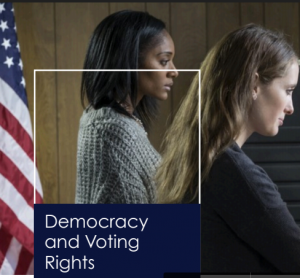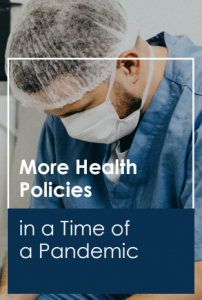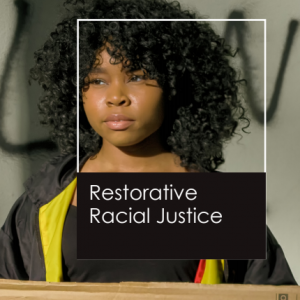VOTER GUIDE
 On Tuesday, June 30, Faith in Public Life and Interfaith Power & Light released a voter reflection guide endorsed by prominent national faith groups and religious leaders. The guide, Democracy, Values & the 2020 Election, addresses urgent issues in the election, including voting rights, climate change, systemic racism in the criminal justice system, healthcare and immigration. The guide, which will be distributed across the country for discussion in diverse faith communities, includes topics for reflection and sample questions to ask candidates Download Full Guide Here
On Tuesday, June 30, Faith in Public Life and Interfaith Power & Light released a voter reflection guide endorsed by prominent national faith groups and religious leaders. The guide, Democracy, Values & the 2020 Election, addresses urgent issues in the election, including voting rights, climate change, systemic racism in the criminal justice system, healthcare and immigration. The guide, which will be distributed across the country for discussion in diverse faith communities, includes topics for reflection and sample questions to ask candidates Download Full Guide Here
Download Spanish-language version of the guide, Democracia, Valores y las Elecciones de 2020
Issues and Questions
 Democracy and Voting Rights (Page 1)
Democracy and Voting Rights (Page 1)
This election is more than a choice between parties and ideologies. An even more fundamental question is at stake: Can we preserve democracy in the face of serious threats to fair elections and fundamental rights?
Questions for Reflection and Candidates
- How do you see democratic values at risk today?
- How do systemic barriers to voting undermine our most sacred democratic values?
- How can your faith community better advocate for stronger voter protections at the state and local level?
- As a candidate, what are your specific plans for protecting and strengthening voting rights?
 Protecting God’s Creation Climate Justice for our Children and World (Page 2)
Protecting God’s Creation Climate Justice for our Children and World (Page 2)
As people of faith, we believe that responding to the urgent threat of climate change is essential to caring for God’s creation and loving our neighbors. Human activity, primarily the burning of fossil fuels for energy, has thrown
nature out of balance, polluted the air, driven thousands of species of God’s creatures to extinction, intensified catastrophic events such as wildfires and hurricanes, and threatened the lives and livelihoods of our most vulnerable brothers, sisters and neighbors around the world. Scientists tell us we have less than a decade to avoid even more catastrophic consequences.
The United States has a unique responsibility to show moral and political leadership:
- Transitioning our economy away from polluting fossil fuels toward 100% clean energy.
- Honoring the emissions-reduction commitments our nation made at the UN Conference on Climate Change in Paris in 2015, and taking additional actions needed to avert catastrophic global warming.
- Assisting developing nations— who are least responsible for climate change but most impacted by it — in coping with threats such as increased droughts, disease, and sea-level rise by sharing technology and financial support.
Questions for Reflection and Candidates
- What does your faith teach about our responsibilities for the Earth and to others? How are they interdependent?
- Has your faith community made an effort to cut emissions, save energy, or practice environmental stewardship?
- As a candidate, what specific policies do you support to protect God’s Creation and secure a safe climate for our children and future generations?
 Loving Our Immigrant Neighbors (Page 4)
Loving Our Immigrant Neighbors (Page 4)
Scripture repeatedly makes clear that immigrants must be treated with dignity. Policies that rip children from their parents’ arms, lock people away in inhumane conditions, and ban desperate families from entering the country
should keep us awake at night. As people of faith, we believe that the way we treat our immigrant neighbors is a sign of how we treat God.
Questions for Reflection and Candidates
- How can we replace immoral immigration policies that tear families apart and cause trauma with an immigration system that values families and affirms the dignity of allv people?
- What can we do to heal the wounds inflicted on immigrant communities by political rhetoric that portrays them as a dangerous “other?”
- If there are immigrants in our community who are feeling isolated and under threat, how can we show support and build connections?
- As a candidate, what will you do to defend the dignity of all immigrants, and how will you further policies that keep families together?
 The Last Shall Be First An Economy of Inclusion (Page 5)
The Last Shall Be First An Economy of Inclusion (Page 5)
Our economic systems should work for all Americans, not only the wealthiest few. This is a matter of justice and
human dignity. All religious traditions recognize that charity is essential to care for the most vulnerable, but helping our neighbors in poverty also compels us to address its root causes. “Charity is no substitute for justice withheld,” St. Augustine observed centuries ago.
Questions for Reflection and Candidates
- What can we do to ensure that all Americans are able to provide for their families and live with security and dignity?
- How do we create a just tax system that is fair to all Americans, including working families who are trapped in poverty?
- Why does the United States lag behind most developed countries when it comes to providing paid sick leave and paid family leave?
- As a candidate, what are your specific plans to ensure workers have living wages and economic security while the coronavirus pandemic continues, as well as for the long term?
 More Health Policies in a Time of a Pandemic (Page 7)
More Health Policies in a Time of a Pandemic (Page 7)
Despite our nation’s stated values of life and equality, the United States is the only industrialized country in the world that does not guarantee its residents universal access to health care. This is a failure of political and moral imagination – especially in a time of pandemic.
Questions for Reflection and Candidates
- How can people of faith be most effective in using our stories, congregations and power to advocate for health care reform?
- What do you struggle with the most when it comes to our healthcare system?
- How has the COVID-19 crisis impacted your community? What policy solutions can keep us all safe and remedy racial and economic inequalities in your community?
- As a candidate, what are your specific plans for making sure that quality,
affordable health care is available for all?
 Restorative Racial Justice (Page 9)
Restorative Racial Justice (Page 9)
Justice and redemption are at the very heart of faith. Restorative justice begins with listening to and empowering communities that have been exploited, excluded and denied equal representation and freedom. The evil ideology of
white supremacy shaped our nation from its founding and continues to impact policies and communities today, especially in the criminal justice system. The killings of Ahmaud Arbery, Breonna Taylor, George Floyd and so many other Black people, Indigenous people, and other people of color, has provoked a growing, multi-racial moral movement for accountability and systemic reforms for racial justice.
Questions for Reflection and Candidates
- How can we dismantle the evil ideology of white supremacy in our culture and political systems?
- What can be done to end racial profiling and police violence against people of color?
- What steps can be taken to ensure formerly incarcerated people have voting rights and fair access to employment?
- As a candidate, what will you do to ensure racial justice is prioritized in the criminal justice system?
- How do we build safe communities for everyone, particularly people of color?
 Made in the Image of God: Respecting the Dignity of LGBTQ People (Page 11)
Made in the Image of God: Respecting the Dignity of LGBTQ People (Page 11)
All people have inherent dignity because everyone is created in the image of God. Our gay, lesbian, bisexual and transgender family members, neighbors and co-workers deserve equal rights, and to live without fear or discrimination.
Questions for Reflection and Candidates
- How can your faith community more fully support the equal dignity of LGBTQ people in your state and local area?
- What are the greatest threats to LGBTQ people in your community and the nation?
- As a candidate, what are your specific plans to ensure that LGBTQ people have equal rights and are treated with dignity
 The Global Common Good: We’re All in This Together (Page 12)
The Global Common Good: We’re All in This Together (Page 12)
What does it mean to love our neighbors as ourselves in a globalized world? The health and future of our country and
communities are interconnected to the health and security of other nations. Our fates are bound up in what Rev. Martin Luther King, Jr., called “an inescapable network of mutuality.”
Questions for Reflection and Candidates
- What policies do you think are most important for creating security for your family and community?
- What role should the United States play in the world to help build global peace and security?
- How can your faith community advocate for policies to create a more peaceful world?
- As a candidate, what programs and policies would you prioritize to help build secure communities and a peaceful world?

Senate Conservation Committee Approves Protections for NM Waters
/in Earth & Faith, Faithful Citizenship, Featured Articles, NEWS /by adminPhoto: Duncan Sill
On Thursday, Jan. 30, the Senate Conservation Committee voted 6-3 to pass SB 21 and SB 22, a pair of bills that will provide critical protections for New Mexico waters. The bills are also assigned to the Senate Judiciary and Finance Committees before they move over to the House and then proceed to a floor vote.
Following rollbacks to federal clean water protections in recent years, up to 95% of New Mexico’s waters have lost protection once provided under the Clean Water Act. Because of these rollbacks and the lack of a state water quality permitting system, American Rivers named all New Mexico rivers atop its list of the most endangered rivers in the country in its 2024 Most Endangered Rivers report.
The bills that passed committee today would ensure federal clean water protections that had existed in New Mexico for decades are continued at the state level. In addition, they will provide authority to the state to take over permitting from the federal government for the waters that are still federally protected, streamlining the process and bringing oversight into the hands of New Mexicans.
“New Mexico waters have lost critical protections in recent years, threatening our drinking water, the health of our communities, and the future of key industries like agriculture and outdoor recreation,” said Rachel Conn, deputy director of Amigos Bravos. “We’re pleased to see the progression of SB 21 and SB 22 that would reinstate decades of prior protections and establish a system to ensure the wetlands and waterways we need for our way of life don’t become contaminated.”
“Our land-based communities depend on clean water in our streams, headwaters, and wetlands to irrigate our fields and care for our livestock,” said Paula Garcia, executive director of the New Mexico Acequia Association. “A state-based permitting system will help protect our acequias and farms for the future.”
“These bills will form a complete surface water permitting program for the state of New Mexico. These protections are critical to ensure our most precious resource is protected for future generations,” said Tricia Snyder, Rivers and Waters Program director for New Mexico Wild. “We’re grateful this important effort is making forward movement in the legislature.”
“Nuevo Mexico must now step up. Urgent action is required. The legislature must adopt protections and programs to safeguard our waterways from pollution,” said Jared Berenice Estrada with The Semilla Project. “These waterways demand our immediate protection for the sake of future generations.”
“With much of the Mimbres and Gila Watersheds at risk due to loss of recent clean water protections, a state permitting program to protect our waters from pollution is needed,” said Allyson Siwik, executive director of the Gila Resources Information Project.\
“New Mexico’s most precious resources are our streams, lakes, and wetlands. But this scarce resource is under singular attack,” said Tannis Fox, senior attorney with Western Environmental Law Center. “These two bills will establish the necessary framework to protect our waters from pollution, and protect New Mexico’s communities,Tribal waters, acequias, wildlife habitat, and outdoor recreation economy now and for the future.”
“Valuing water and valuing life are one and the same,” said Rev. Clara Sims, assistant executive director of New Mexico & El Paso Interfaith Power and Light. “In the absence of federal protections, our state leaders have an urgent and sacred responsibility to protect our precious waterways of New Mexico for the thriving of all our communities of life, human and beyond, for all generations to come.”
IPL Joins Advocates in Call to Legislature for Climate Action
/in Earth & Faith, Faithful Citizenship, Featured Articles, NEWS, NM Legislature /by adminOn Tuesday, January 28, advocates with Food & Water Watch gathered at the Roundhouse to urge the legislature to stop the entrenchment of factory farms in New Mexico, as these facilities contribute greatly to climate change, use up scarce water supplies, cause water and air pollution, harm the welfare of animals, exploit workers, and push family farms out of business.
In particular, advocates encouraged elected officials to support SB 99, also known as the Methane Emissions Reduction Act (MERA), which aims to fix a loophole in the recently passed Clean Transportation Fuel Standard. Closing this loophole would help prevent factory farms from being lavishly incentivized to profit from their pollution.
New Mexico & El Paso Interfaith Power and Light, came out in support of this action.
In addition to gathering in Santa Fe to urge elected officials to support the bill, throughout the past week New Mexicans from across the state came together to urge elected officials to act through a series of events like a film screening and art build. Read More
Three Important Climate Bills in the New Mexico Legislature
/in Earth & Faith, Faithful Citizenship, Featured Articles, NEWS, NM Legislature /by adminBy Rev. Clara Sims, Assistant Executive Director, IPL New Mexico & El Paso
In that spirit, here are the three major climate bills of this session….
Senator Pro Tem, Mimi Stewart, has introduced three ambitious climate bills that work in tandem to reduce greenhouse gas emissions, equip communities for fossil-fuel free economic innovation and development, and fund state agencies so they can better manage their roles of support and enforcement.
Clear Horizons (SB 4)
Seeks to codify into law the Governor’s 2019 executive order of climate emission reductions targets (an order alligned with the Paris Climate Accords).
This would mean bringing business, transportation and the energy sector into alignment with those targets. The Environmental Improvement Board (EIB) would have responsibility for rule-making and oversight.
Community Benefits Fund (SB 48)
This is a pot of money ($340 million) designated to help communities transition economically to cleaner sources of energy and industry, including helping fund projects that do things like create bike and pedestrian lanes, implement grid modernization, fund electric school buses, and help foster workforce development. Below is a break down of funding:
Innovation in State Government Fund (SB 83)
The goal is to better equip our state government and agencies to handle big projects and work with new, upgraded technology. Part of the goal is to help agencies think “outside the box” of their current budgets about ways to help support emissions reductions.
For more information about all three of these bills, you can visit a wesbite created by various climate and frontline community partners. The website can be found HERE.
What can you do to support this legislation?
To contact your local congressional represenative, you can find their information at “find my legislator.”
If you want to write a Letter to the Editor (LTE) or ammend one that is drafted for you, please be in touch with Clara Sims (clara@nm-ipl.org).
To be kept in the loop about key hearings for public comment, sign up to be on our advocacy list. To be added, please contact our advocacy chair Ruth Striegel (ruthstriegel@gmail.com) and/or our assistant director Clara Sims (clara@nm-ipl.org).
Clear Horizons (SB 4) is being heard in the Senate Conservation Committee tomorrow morning, Tuesday the 28th at 9:00 am. There were only a very limited number of slots for public speakers this time around, but we will need all the community support possible going forward to push this over the finish line in other committies, so please stay tuned. If you want to listen in to the hearing, here is the zoom link. Prayers for a good outcome at tomorrow’s hearing matter and are most welcome!